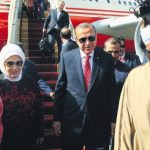Despite a societal shift to the left, the Islam-focused policies of Turkey’s ruling party have begun to remake Turkish politics and society, and may yet spur the emergence of a secular generation and ultimately reshape the diaspora, analysts say.
Turkey’s ruling Justice and Development Party (AKP) is widely considered Islamist, yet during its 17 years in power the population’s level of religiosity appears to have declined, according to a January study by leading pollster Konda.
Georgetown University’s Berkeley Center for Religion, Peace and World Affairs this week invited a handful of scholars of Turkey and Islam to examine the reasons for this shift and consider the possible impact.
Yusuf Sarfati, an associate professor of politics and government at Illinois State University, argued that the decline was mainly a result of the AKP grabbing full control of Turkish Islam.
The tension that exists in many countries between the Islam of the state and that of Islamists ended in Turkey when the AKP came to power. The AKP expanded the budget, size and influence of the Directorate of Religious Affairs, or Diyanet, and made state Islam increasingly exclusionary, nationalistic, and authoritarian, according to Sarfati.
Perhaps most importantly, Turkey’s many diverse Islamic organisations were swallowed by the Islamist state. “These civil society organisations developed patronage relations with the state, became heavily dependent on public funds, and were co-opted by the state apparatus,” said Sarfati, who also mentions AKP corruption as driving people away from Islamic faith.
“Increasing monopolisation of religious authority in Turkey by the AKP repressed religious pluralism and competitive religious markets both in the political and civil spheres. This leads to the current decline in piety across Turkish society,” he said.
Ahmet Erdi Öztürk, a post-doctoral scholar in residence at the University of Notre Dame’s Kroc Institute for International Peace Studies, saw President Recep Tayyip Erdoğan aiming to recast Turkey in a Sunni Islamic mould, by empowering the Diyanet and presenting himself as a protector of the global Muslim community, or ummah.
Yet the president and the AKP have come up against the same problem faced by Turkey’s founding regime. Decades of secular-minded policies from the republic’s founder Mustafa Kemal Atatürk failed to diminish religious conservatism, which is why an Islamist generation, led by Erdoğan, later rose to prominence.
“One might argue that Turkey’s society has once again resisted religious-oriented social engineering, just as it has throughout history,” wrote Öztürk, referring to the Konda study. “Yet on other fronts, it does appear that Erdoğan’s efforts are starting to pay off, even if in subtle ways.”
Candidates for the secularist main opposition Republican People’s Party (CHP) won several tight races in Turkey’s March 31 elections thanks in part to Islam-friendly campaigns. The former party of Atatürk chose a committed Muslim, Ekrem İmamoğlu, who scheduled time for Friday prayers while campaigning, as its candidate for Istanbul mayor, and apparently won that still-contested race. Some victorious CHP candidates decided to swear their oathsof office on the Quran.
“Even if these gestures were more tactical than heartfelt, they still betray the reality: whatever society as a whole might think, Erdoğan is successfully reshaping Turkey in his preferred image,” said Öztürk.
İhsan Yılmaz, chair of Islamic studies at Deakin University in Melbourne, Australia, worries that Erdoğan’s Islamist discourse and personality cult could influence the Turkish diaspora.
Turkey’s president has endlessly demonised his critics, dividing the country into those who believe in a conservative, Ottoman-style authoritarian power, and those who do not, according to Yılmaz.
“Domination of media outlets has a vital importance in this social and political radicalisation. In addition to the media, the judiciary, police force, and military have all been Erdoğanised,” said Yılmaz, also mentioning the president’s increasing control of education in order to encourage Islamic conservatism.
Now Erdoğan is reaching out to the diaspora, organising pro-government rallies in European cities and creating the Presidency for Turks Abroad (YTB) to streamline other coordinating activities. YTB works with Turkey’s state-run Anadolu news agency, for instance, to increase collaboration between Turkish journalists at home and abroad.
“Turkey has a capacity to exert transnational influence over its expatriates and has been manipulating its émigré population in Europe to advance its domestic and foreign policy interests,” said Yılmaz, adding that Ankara favours AKP supporters over Erdoğan critics.
“The ideology and discourse of Erdoğanism have already penetrated into the Turkish Sunni community members in the West, which is dangerous given the anti-Western, discriminatory, and even violent tone of this ideology,” he said.
Gökhan Bacik, Ahval columnist and political science professor at Palacky University in the Czech Republic, argued that religiosity in Turkey had failed to increase thanks to a radical change within Turkish culture over the past 20 years.
“Right now, Turkey is going through a sexual revolution reminiscent of the 1960s in Europe,” he wrote. “Islamisation is mostly felt at the administrative level in Turkey, but we are not observing a radical change at the sociological and legal levels.”
So how might all this end? Ahmet Kuru, political science professor at San Diego State University, sees a corrupt Islamist regime led by Erdoğan being toppled by a reactionary generation of staunch secularists.
“Every action leads to some form of reaction. This is true regarding the relationship between religion and politics in the history of Turks,” wrote Kuru, highlighting how the secular-minded Young Turks followed the reign of Islamist Sultan Abdulhamid. “I predict that the Islamist regime will create a radical reaction: a staunchly secularist new generation (that) will terminate the Islamist regime.”
Source: Ahval News



